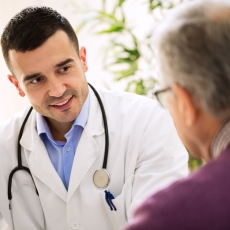
Diverticulosis and Diverticulitis
Also called: Diverticular disease
Diverticulosis and Diverticulitis
National Institutes of Health
Other Languages
Diverticula are small pouches that bulge outward through the colon, or large intestine. If you have these pouches, you have a condition called diverticulosis. It becomes more common as people age. About half of all people over age 60 have it. Doctors believe the main cause is a low-fiber diet.
Most people with diverticulosis don't have symptoms. Sometimes it causes mild cramps, bloating or constipation. Diverticulosis is often found through tests ordered for something else. For example, it is often found during a colonoscopy to screen for cancer. A high-fiber diet and mild pain reliever will often relieve symptoms.
If the pouches become inflamed or infected, you have a condition called diverticulitis. The most common symptom is abdominal pain, usually on the left side. You may also have fever, nausea, vomiting, chills, cramping, and constipation. In serious cases, diverticulitis can lead to bleeding, tears, or blockages. Your doctor will do a physical exam and imaging tests to diagnose it. Treatment may include antibiotics, pain relievers, and a liquid diet. A serious case may require a hospital stay or surgery.
NIH: National Institute of Diabetes and Digestive and Kidney Diseases
- Abdominal and Pelvic CT
 (American College of Radiology, Radiological Society of North America)Also in Spanish
(American College of Radiology, Radiological Society of North America)Also in Spanish - Abdominal exploration - slideshow (Medical Encyclopedia)Also in Spanish
- Colonoscopy: MedlinePlus Health Topic
 (National Library of Medicine)Also in Spanish
(National Library of Medicine)Also in Spanish - Fecal Occult Blood Test (FOBT)
 (National Library of Medicine)Also in Spanish
(National Library of Medicine)Also in Spanish - Lower GI Series (Barium Enema)
 (National Institute of Diabetes and Digestive and Kidney Diseases)Also in Spanish
(National Institute of Diabetes and Digestive and Kidney Diseases)Also in Spanish
- Colon diverticula - slideshow (Medical Encyclopedia)Also in Spanish
- Colostomy - slideshow (Medical Encyclopedia)Also in Spanish
- Treatment for Diverticular Disease
 (National Institute of Diabetes and Digestive and Kidney Diseases)Also in Spanish
(National Institute of Diabetes and Digestive and Kidney Diseases)Also in Spanish
- Dietary Fiber: Essential for a Healthy Diet (Mayo Foundation for Medical Education and Research)Also in Spanish
- Diverticulitis Diet (Mayo Foundation for Medical Education and Research)Also in Spanish
- Diverticulitis Diet: Can Certain Foods Trigger an Attack?(Mayo Foundation for Medical Education and Research)Also in Spanish
- Fiber: How to Increase the Amount in Your Diet (American Academy of Family Physicians)Also in Spanish
- Diverticula, Diverticulosis, Diverticulitis: What's the Difference?(International Foundation for Functional Gastrointestinal Disorders)
- ClinicalTrials.gov: Diverticular Diseases
 (National Institutes of Health)
(National Institutes of Health) - ClinicalTrials.gov: Diverticulitis
 (National Institutes of Health)
(National Institutes of Health) - ClinicalTrials.gov: Diverticulum, Colon
 (National Institutes of Health)
(National Institutes of Health)
- Article: Epidemiology, Pathophysiology, and Treatment of Diverticulitis.
- Article: Guidelines for Colonic Diverticular Bleeding and Colonic Diverticulitis: Japan Gastroenterological Association.
- Article: Sigmoido-Cecal Fistula: A Rare Case of Complicated Recurrent Diverticulitis and a...
- Diverticulosis and Diverticulitis -- see more articles
- American Society of Colon and Rectal Surgeons
- Find a Gastroenterologist (American College of Gastroenterology)
- National Institute of Diabetes and Digestive and Kidney Diseases

- Bland diet (Medical Encyclopedia)Also in Spanish
- Colonoscopy (Medical Encyclopedia)Also in Spanish
- Diverticulitis (Medical Encyclopedia)Also in Spanish
- Diverticulitis and diverticulosis - discharge (Medical Encyclopedia)Also in Spanish
- Diverticulosis (Medical Encyclopedia)Also in Spanish
- Large bowel resection - discharge (Medical Encyclopedia)Also in Spanish
- Low-fiber diet (Medical Encyclopedia)Also in Spanish
- Lower GI Series
 (National Institute of Diabetes and Digestive and Kidney Diseases)
(National Institute of Diabetes and Digestive and Kidney Diseases) - Virtual colonoscopy (Medical Encyclopedia)Also in Spanish





















.png)












No hay comentarios:
Publicar un comentario